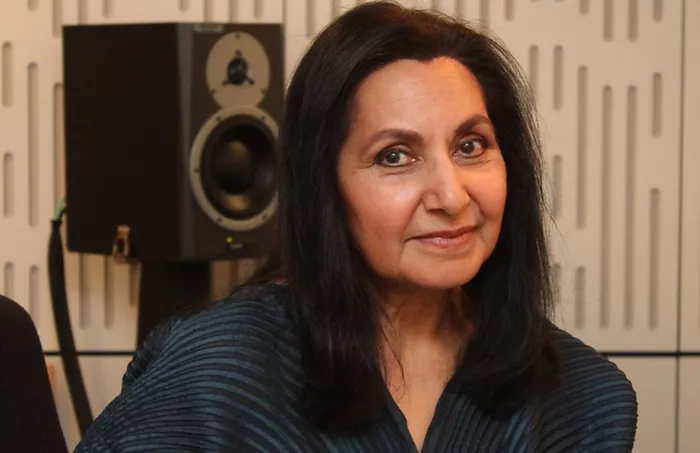Imtiaz Dharker stands as a prominent figure among 21st-century British poets. Her work, characterized by its exploration of identity, displacement, and resilience, offers a profound insight into contemporary British poetry. As a British poet of Pakistani origin, Dharker’s unique perspective enriches the literary landscape, making her an essential voice in modern poetry.
Imtiaz Dharker
Born in Lahore, Pakistan, in 1954, Imtiaz Dharker moved to Glasgow, Scotland, with her family when she was less than a year old. This early migration introduced her to themes of cultural displacement and identity, which would later permeate her poetry. Growing up in Scotland, Dharker experienced the complexities of navigating multiple cultures, an experience that deeply influenced her poetic voice.
Literary Career and Achievements
Dharker’s literary journey is marked by numerous accolades and contributions to British poetry. She has published several poetry collections, including Purdah (1989), Postcards from God (1997), I Speak for the Devil (2001), The Terrorist at My Table (2006), Leaving Fingerprints (2009), Over the Moon (2014), and Luck is the Hook (2018). Her work is often accompanied by her own illustrations, showcasing her multifaceted artistic talents.
In recognition of her contributions to literature, Dharker was awarded the Queen’s Gold Medal for Poetry in 2014, joining an illustrious group of poets who have received this honor. Her poems are also featured in the British GCSE and A-Level English syllabuses, reflecting her influence on contemporary education.
Themes in Dharker’s Poetry
Dharker’s poetry delves into themes of home, freedom, cultural displacement, conflict, and gender politics. Her work often reflects her personal experiences and observations, providing a voice to those navigating the complexities of identity in a multicultural society.
Cultural Displacement and Identity
Growing up between cultures, Dharker’s poetry frequently explores the sense of belonging and the challenges of cultural identity. In her poem “Tissue,” she uses the metaphor of paper to discuss the fragility and interconnectedness of human existence, highlighting how identities are constructed and deconstructed.
Gender and Social Issues
Dharker addresses gender politics and social issues with sensitivity and insight. In “A Century Later,” she reflects on the courage of girls fighting for their right to education, drawing inspiration from real-life events such as the shooting of Malala Yousafzai. The poem portrays the resilience of young women in the face of oppression, emphasizing the transformative power of education.
Conflict and Resilience
Conflict, both internal and external, is a recurring theme in Dharker’s work. Her poems often depict the struggles of individuals and communities facing adversity. Despite the challenges, her poetry conveys a sense of hope and resilience, illustrating the human capacity to endure and overcome.
Style and Language
Dharker’s poetic style is characterized by clarity, simplicity, and evocative imagery. She employs straightforward language to convey complex themes, making her work accessible to a broad audience. Her use of simple clauses and vivid metaphors allows readers to engage deeply with the emotional and intellectual layers of her poetry.
Comparison with Contemporary British Poets
To understand Dharker’s place in 21st-century British poetry, it is helpful to compare her work with that of her contemporaries.
Carol Ann Duffy
Carol Ann Duffy, the first female Poet Laureate of the United Kingdom, is known for her exploration of gender, identity, and social commentary. Like Dharker, Duffy uses accessible language and vivid imagery. However, while Duffy often employs dramatic monologues and persona poems, Dharker’s work is more introspective, focusing on personal experiences and cultural observations.
Simon Armitage
Simon Armitage, the current Poet Laureate, is recognized for his colloquial style and engagement with contemporary issues. Armitage’s poetry often reflects on everyday life and societal concerns. In contrast, Dharker’s work delves into themes of cultural displacement and identity, offering a more global perspective within British poetry.
John Agard
John Agard, a British poet of Guyanese origin, explores themes of history and identity, particularly in relation to colonialism and cultural heritage. In his poem “Checking Out Me History,” Agard critiques the Eurocentric portrayal of history, a theme that resonates with Dharker’s exploration of cultural narratives in “Tissue.” Both poets challenge dominant historical narratives, advocating for a more inclusive understanding of identity.
Influence and Legacy
Imtiaz Dharker’s contributions to British poetry extend beyond her written work. She actively participates in educational initiatives, such as Poetry Live!, engaging with students across the United Kingdom. Her involvement in these programs underscores her commitment to fostering a love for poetry among young people.
Dharker’s poetry, featured in educational curricula, has become a staple in the study of contemporary British literature. Her exploration of themes relevant to modern society ensures her work remains pertinent and influential.
Conclusion
Imtiaz Dharker’s poetry embodies the essence of 21st-century British poetry. Her exploration of identity, cultural displacement, and resilience offers a profound insight into the human experience. As a British poet, her work bridges cultural divides, enriching the literary landscape with diverse perspectives. Through her accessible language and evocative imagery, Dharker continues to inspire readers and contribute significantly to contemporary British poetry.

